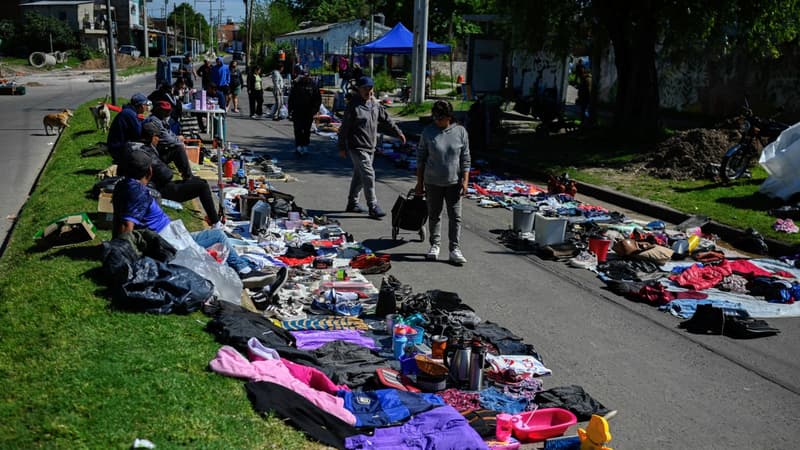In increasingly numerous street unpackings, on social networks, to their neighbors, they sell, buy and resell. To generate a mini margin, hold it until the end of the month. In Javier Milei’s Argentina, on the eve of legislative elections, austerity and debt are intensifying resilience strategies.
The “fair” of Villa Fiorito, a popular suburb of greater Buenos Aires, extends along 20 blocks, almost two kilometers. Informal fair, where on Sunday improbable inventories are piled up on blankets on the floor: old ice buckets, a thermos without a lid, pants, magazines, dilapidated appliances, dishwashing products… Everything is fine, explains one of these blankets, Gladys Gutiérrez, 46, who displays toiletries, soaps, lotions, clothes… And she tells of the constant juggling with little ones matters, in the middle of the fair, under the gaze of Diego Maradona, the idol born in the neighborhood and whose frescoes cover the walls.
Martín González, “cartonero”, collector-recycler, says that he regularly goes to the capital, with his garbage containers, 20 kilometers away, “to collect things, which we bring here and resell, for daily use.”
Record debt
Sometimes “that’s enough for lunch, then you have to go back to look for it,” she explains in front of her eclectic stand: a hose, jugs, a sink plunger, construction helmets… “People are tired, angry,” Gladys Gutiérrez complains. Whose husband, a qualified bricklayer, has been out of work “for quite some time”.
More than 200,000 jobs, both public and private, were lost during the two years of budgetary austerity of the president, the ultra-liberal Javier Milei, with the construction sector on the front line, through the freezing of public works. These job losses and anemic economic activity have prevented most Argentines from feeling the benefits of controlled inflation. Especially in a country where more than 40% of employment is informal. As is largely the case here in Villa Fiorito.
According to a report from the Central Bank, the household financial delinquency rate increased in August for the tenth consecutive month, reaching 6.6% of total loans, a record since the creation of this index in 2008.
Survival ecosystem
Javier Milei is proud to have reduced poverty in 12 months, in part thanks to controlled inflation and a sustained effort in allocations to the poorest. But in Fiorito, a Peronist bastion (center-left opposition), he barely has to wait for the mid-term legislative elections on Sunday: in 2023, in the presidential elections, he had obtained a pale 27% (55.7% at the national level).
However, the indebtedness, the multiplicity of forced jobs, the informal sales, in no way began with the Milei government, emphasizes Matías Mora. Instead, with him, “they deepened and worsened.” According to a May study by the private firm IETSE, 91% of Argentine households were in debt: more than 85% of the debts were contracted in 2024 or 2025.
“It reminds me a lot of 2001,” says Juana Sena, 71, referring to the times of the great financial crisis of 2001, which caused a social explosion (39 deaths): “On the corners we see people at the tables selling cakes or homemade breads, we see clothes for sale, displayed in the windows.”
In addition to these street sales, Matías Mora points out, a whole world of “digital vendors” is developing, where thousands of participants, divided by areas, sell a stroller, a piece of furniture, a homemade dish… In case of emergency, most of the time. “At this price, because I need the money today. Please write privately,” one ad said this week.
Source: BFM TV


